Love to share everything with your cat? Us too – sharing food with your cat is a great way to bond, but not everything we humans eat is safe for our feline friends. Whether you’re looking for ways to make your cat’s diet more interesting or you just want to know if you can share your favorite snack with them, it’s important to know which human foods cats can eat. Cats are very different from humans, certain foods we enjoy can upset a cat’s stomach or even poison them.
Did you know that cats also have significantly fewer taste buds than humans? While humans boast between 2,000 – 10,000 taste buds, cats have only around 470 – 500. This means that our feline friends experience flavors quite differently from us. Unlike humans, who relish the complexity of flavors in their meals, cats rely more on texture and smell when it comes to their food preferences. So, the next time you see your cat turning its nose up at a sugary treat or spicy morsel, remember, it’s not being picky—it simply can’t taste them the way we do!
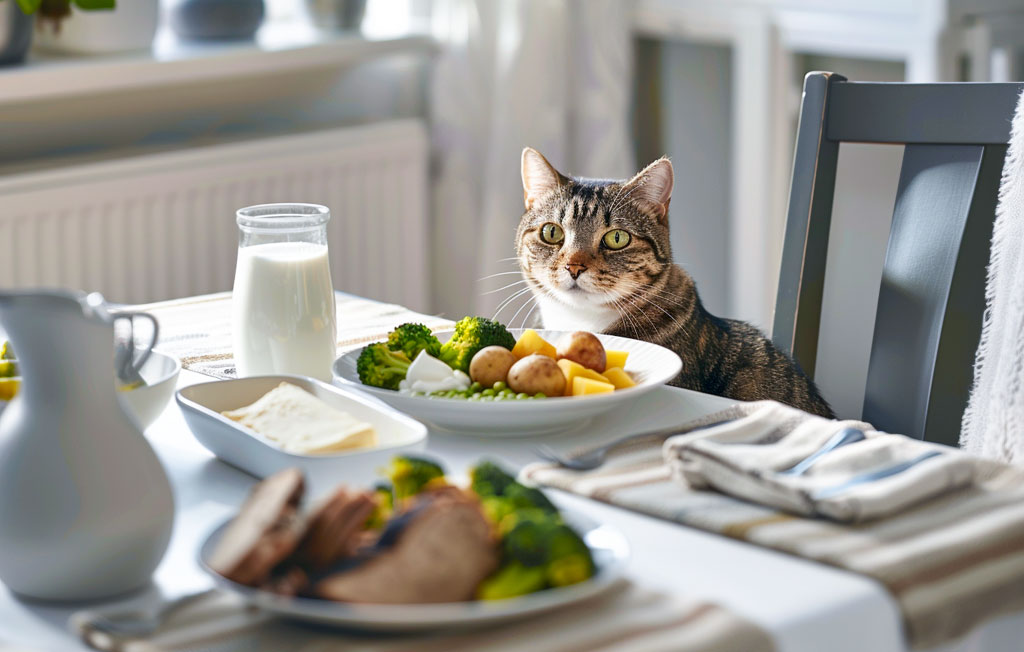
Nutritionally complete meals are the most important thing when it comes to your cat’s daily diet, but mixing it up with different ingredients is great for their well-being and treats are crucial for training, rewards, and mental stimulation.
Moderation is key and you should always consult your vet before making drastic changes to your cat’s diet, but let’s take a look at some of the things you can – and can’t – incorporate. If you’re interested in raw feeding, be sure to read our list of the best raw cat food, too.
In this article
Fruits Cats Can Eat
Did you know cats lack sweetness receptors? So, they won’t experience fruit the same way we do. Even, so many fruits are safe to share with your cat – in moderation! A few bites will suffice, as fruit is high in sugar and fructose, even if it is natural and low in other things, like fat and salt. What fruits are safe for cats? Let’s take a look.
Apples
Apples are a crunchy, healthy snack packed with fiber and quercetin which supports healthy digestion and histamine levels, as well as vitamins A & C, which are high in antioxidants and anti-inflammatories. A couple of slices is a sufficient serving, but you can also mash them up and cook them or freeze some pure apple juice for a cool summer snack.
Bananas
Can cats eat bananas? Yes! In fact, they’re a great source of potassium, which helps to support good heart and kidney function, as well as soluble fiber, vitamin C, and B6, an essential metabolic nutrient. That said, bananas should be more of a weekly treat than a daily one, and a couple of small slices are more than enough for your cat.
Watermelon
Refreshing and hydrating, a few small chunks of watermelon is a great pet-safe option, as it’s mostly water, but it also contains small levels of potassium and vitamin C.
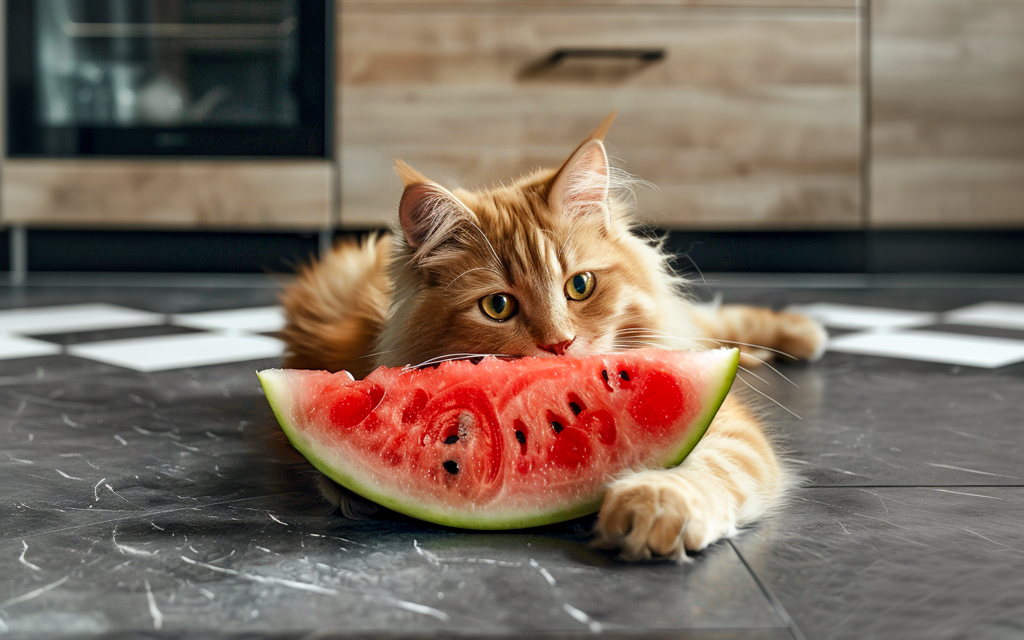
Pears
Similarly to apples, pears are packed with fiber and vitamins A & C, as well as essential antioxidants that benefit the heart and gut.
Berries
A delicious human favorite, a small handful of berries like strawberries, raspberries, blueberries, blackberries, and cranberries can also be enjoyed by cats on a daily basis. They are rich in folates and vitamin C.
Blueberries in particular are said to be a great snack for senior cats due to their anti-inflammatory, age-fighting properties, and cranberries are famously good for urinary health.
Mango
Mango makes a great treat for your cat. It’s a great source of vitamins C, A, and E, which support healthy heart, eyesight, muscles, skin, and coat.
Kiwi
Kiwi is another good fruit for cats, with high levels of free-radical fighting vitamin C and fiber. Just make sure the skin is removed first, as the hairs can irritate your cat’s mouth and stomach.
Pineapple
This tropical fruit is a favorite of many, and cats are no exception, so long as you remove the skin. It’s a good source of magnesium and potassium, which is great for feline immune systems and supports whole body health.
Can Cats Have Stone Fruits?
The flesh & skin of stone fruits such as cherries, peaches, plums, and apricots are fine for cats to eat in small portions, but you must remove the leaves, stems, and stones from the fruit as they are choking hazards and contain toxins which can harm your cat.
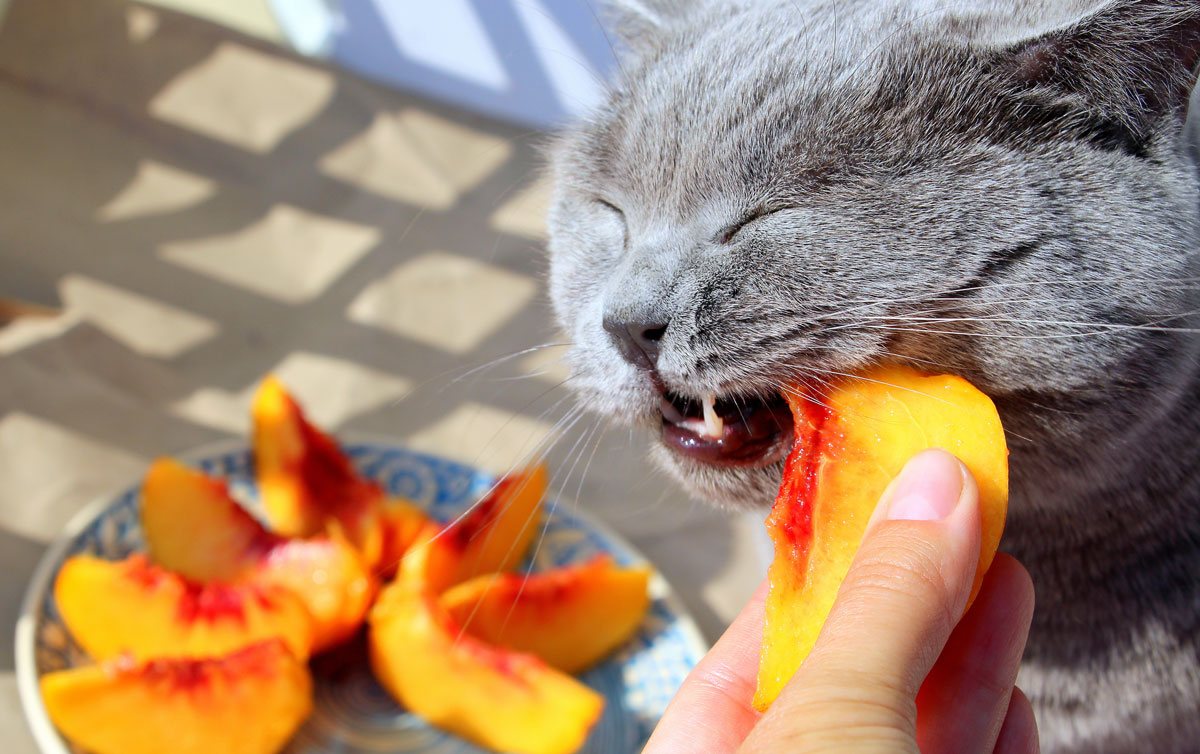
Fruits That Are Toxic To Cats
- Grapes
- Raisins
- Oranges
- Lemons
- Limes
- Avocado
Vegetables Cats Can Eat
Vegetables may be an essential staple of the human diet, but most cats don’t really need them. However, they can still bring some bonus nutrients, taste, and texture to your cat’s meals, as well as some extra fiber, which can really benefit cats with digestive issues. Just make sure you keep it restricted to a few small, bite-sized bits! What vegetables are safe for cats? Let’s take a look.
Carrots
Carrots can be served to cats raw and crunchy or cooked and soft. They contain beta carotene, which the body converts into vitamin A, plus vitamin K, which supports blood health. They’re also rich in potassium, calcium, and iron.
Leafy greens
Leafy greens like cabbage, lettuce, kale, sprouts, and spinach are a great thing to mix into your cat’s daily meals in small quantities, especially if they have digestive issues, as they are an excellent source of fiber, but they’re not just empty calories.
Cabbage also contains anti-inflammatories which are great for arthritic cats, sprouts contain phosphorus & vitamin K, and lettuce is mostly water which can help to keep your cat hydrated. Kale is also rich in vitamins and contains calcium, potassium, copper, & manganese, and spinach is loaded with vitamins and minerals like iron, magnesium, and folate.
Sweet potatoes
Sweet potatoes make a fantastic addition to feline diets in moderation, so long as they’re thoroughly cooked. They are high in beta-carotene which fights inflammation and contain amino acids. In fact, it’s one of the best veggie sources of vitamin A!
Corn
Corn is one of the richest dietary sources of linoleic acid, which is an essential acid for skin and coat health. So it’s great for soft, shiny fur and skin issues. It’s also rich in specific antioxidants which may help to prevent heart disease and strokes.
Broccoli & cauliflower
Broccoli and cauliflower are both high in fiber and especially beneficial for senior cats as they are rich in anti-inflammatories and antioxidants. Broccoli also contains vitamin C, potassium, folate, and glucosinolates, whilst cauliflower is high in vitamin B.
Peas & beans
These green garden veggies are some of the best your cat can eat. Peas are loaded with B vitamins and offer up healthy amounts of calcium, magnesium, iron, zinc, and potassium, whilst green beans contain crucial nutrients like thiamin, niacin, and magnesium.
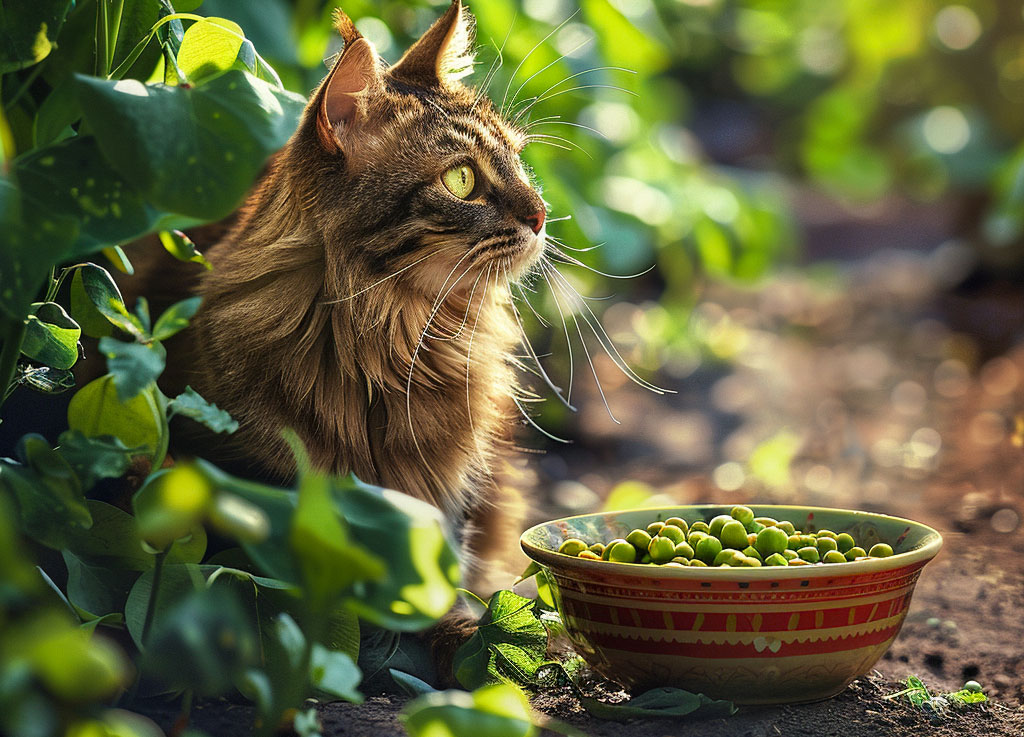
Celery
Celery can be eaten cooked or raw and it’s packed with essential vitamins and minerals. It also contains 25 anti-inflammatory compounds that can help to decrease swelling, pain & discomfort, making it an ideal snack for senior cats.
Pumpkin
Pumpkin is famously fantastic for improving and regulating digestion, as well as aiding recovery from constipation and diarrhea. It can be canned or homemade, but it must be plain and cooked!
Mushrooms
Regular shop-bought mushrooms like white button and shiitake mushrooms are perfectly safe for cats in moderation, and some supplemental mushrooms like lion’s mane are said to have wonderful cognitive benefits for cats. Cats can eat raw or cooked mushrooms, but be sure to avoid wild mushrooms, as they can be toxic.
Speaking of mushrooms, we can’t say enough great things Critical Immune Defense for pets, made of natural ingredients like maitake mushroom and white turmeric root extract – it reduces inflammation, promotes healthy cell growth, and protects against food, water & environmental toxins.
Bell peppers
Cooked slices of bell pepper also also safe for cats and are actually a great source of vitamins A & C, especially the red and yellow ones. Just avoid giving them to your cat raw!
Cucumber
A few sticks or slices of cucumber are a great daily snack for your cat! It’s mostly water and very low in calories, but it is does contain magnesium, potassium, and vitamin K.
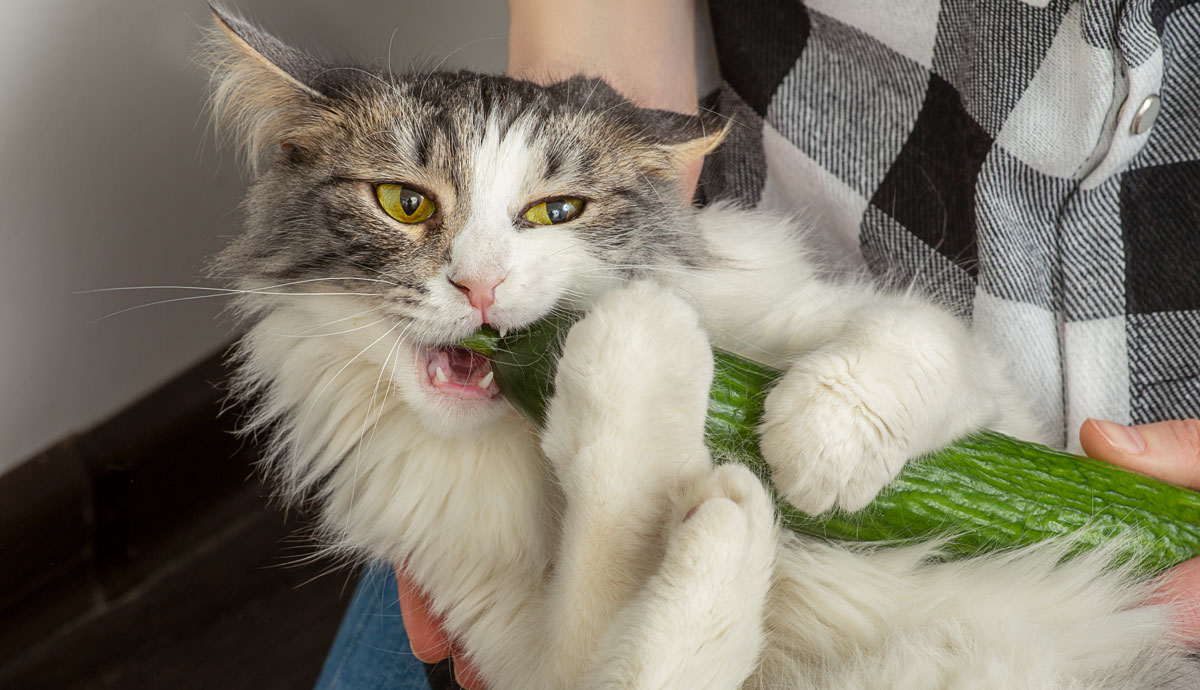
Rutabaga, turnips & parsnips
Cooked rutabaga, turnips, and parsnips are all great options if you want to include some occasional veggies in your cat’s dinner. They’re all excellent sources of fiber and contain essential nutrients and antioxidants for whole-body health.
What About Legumes & Pulses?
Legumes and pulses like chickpeas and black beans are safe for cats to eat to spice things in small doses every now and then, but they shouldn’t be a part of your cat’s daily diet.
Vegetables That Are Toxic To Cats
- Onions
- Leeks
- Eggplant
- Garlic
- Chives
Meat Cats Can Eat
The majority of your cat’s diet should be protein-based. In fact, the general guideline is at least 5.2 grams of protein per kilogram of body weight per day, so it’s important to know which meats your cat can eat! It’s great to switch it up, too – just so long as it’s cooked!
Your cat should only eat raw meat if you’ know it’s been safely prepared. If you’re interested in having your cat on a raw food diet, we suggest some of these great brands in our “Best Raw Cat Food” article.
Can cats eat chicken?
Yes! Chicken is a great source of lean, daily protein for cats, keeping them slim and strong, and it’s rich in amino acids for shiny coats, strong bones, and robust immune systems. Any cooking method is fine – except for frying it in something unhealthy!
Can cats eat fish?
Fish is a firm feline favorite as it is rich in protein and Omega fatty acids which contribute to strong bones and joints, as well as healthy cognition, skin & coat. However, it must be cooked; baked, grilled, or boiled white fish with the bones removed is best.
Blue fish like tuna and sardines and oily fish like salmon are fine a few times per week so long as they are packaged without extra flavorings, and cooked shellfish like prawns are fine as an occasional treat.
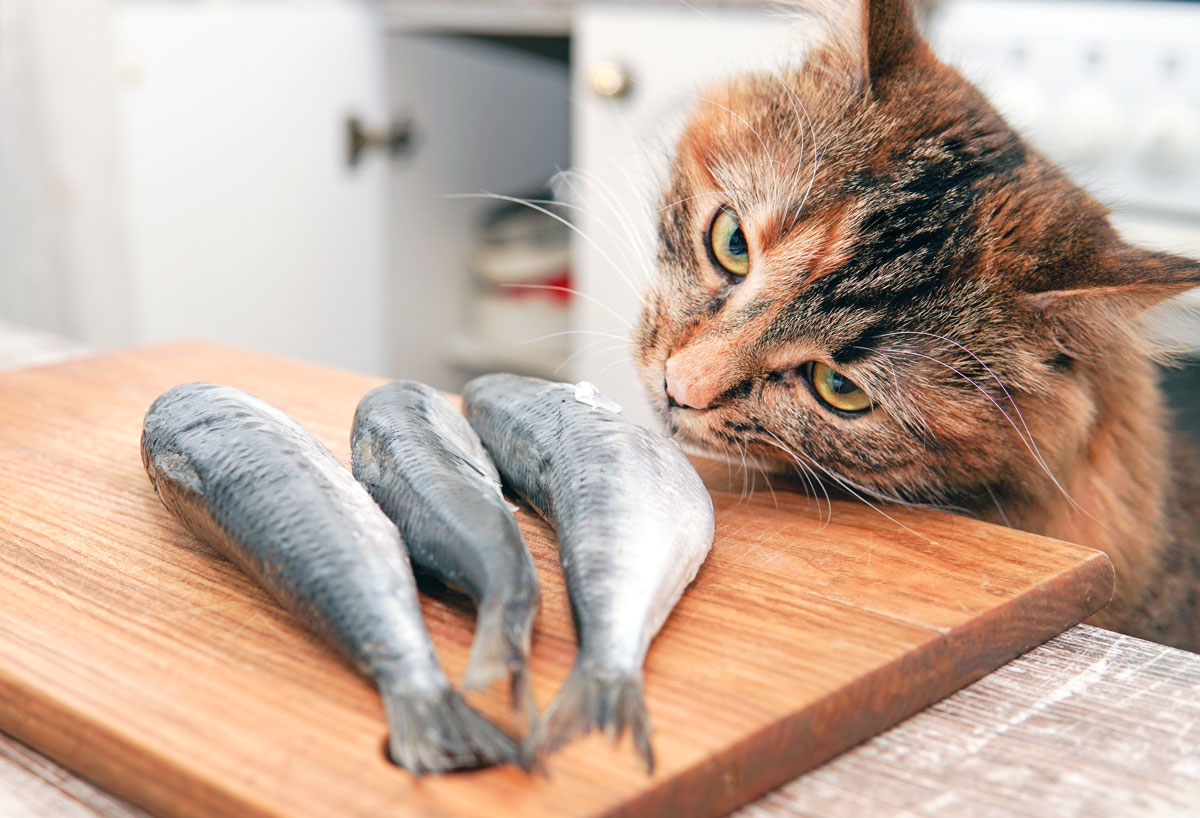
Can cats eat turkey?
Turkey, like chicken, is another good source of lean protein that can be eaten daily. It’s also lower in fat and carbs than any other meat, so it’s great for cats who struggle with weight management.
Can cats eat beef?
Beef and beef liver are excellent for cats. They’re rich in essential amino acids and minerals like iron, zinc, manganese, and selenium, which are all important for health and nourishment. Beef is also a great source of vitamin A, C, and B complex vitamins.
Can cats eat pork?
Pork is a cat-safe meat, but it should be an occasional treat, rather than a regular source of protein, as it’s quite high in fat.
Can cats eat lamb?
Lamb is another good meat for cats, containing a significant amount of B vitamins, including cobalamin, folic acid, biotin, and pantothenic acid, which help the feline body to continue metabolizing efficiently.
Dairy & Eggs
It’s a common misconception that milk is a healthy human food for cats. We all know the stereotype of the cat drinking a saucer of milk, but in reality, cats are naturally lactose intolerant! So, if you’re going to give your cat milk, it needs to be lactose-free, specially made cat milk, or a plant-based alternative, like oat milk, but what about other types of dairy? Let’s take a look!
Can cats eat cheese?
Cats can eat small slices of cheese as a treat or an occasional meal topper because even though it’s made from milk, it’s low in lactose. However, it’s still high in fat, so moderation is key. Cheddar, swiss, and parmesan are good choices.
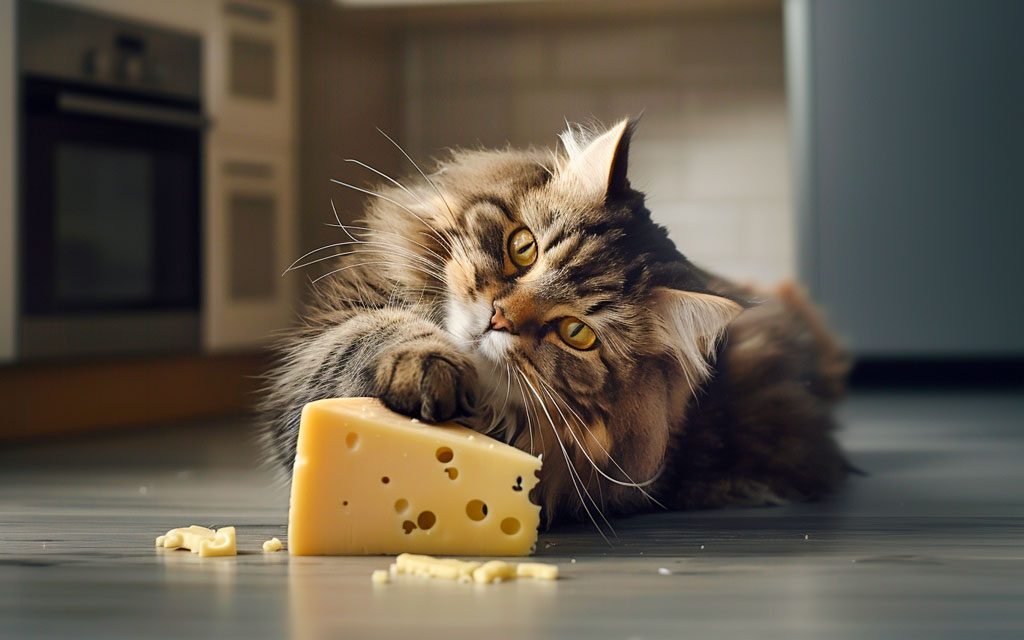
Can cats eat yogurt?
Yes! In fact, a few spoonful’s of yogurt is actually a beneficial snack for cats, as it’s rich in natural probiotics, which are great for digestive health. It’s a good source of calcium, too, just make sure it’s plain and unsweetened and doesn’t contain Xylitol.
Can cats have butter?
A bit of butter in or on other things isn’t going to harm your cat, but there’s no reason to purposefully include it in their diet, as it’s very high in fat!
Can cats eat eggs?
Yes! Eggs are a wonderful source of protein for cats, especially when scrambled or boiled. Aside from being rich in protein, eggs are also a great source of linoleic acid, Vitamin B2, and B12, as well as water-soluble Vitamin A, which are wonderful for a cat’s skin and coat.
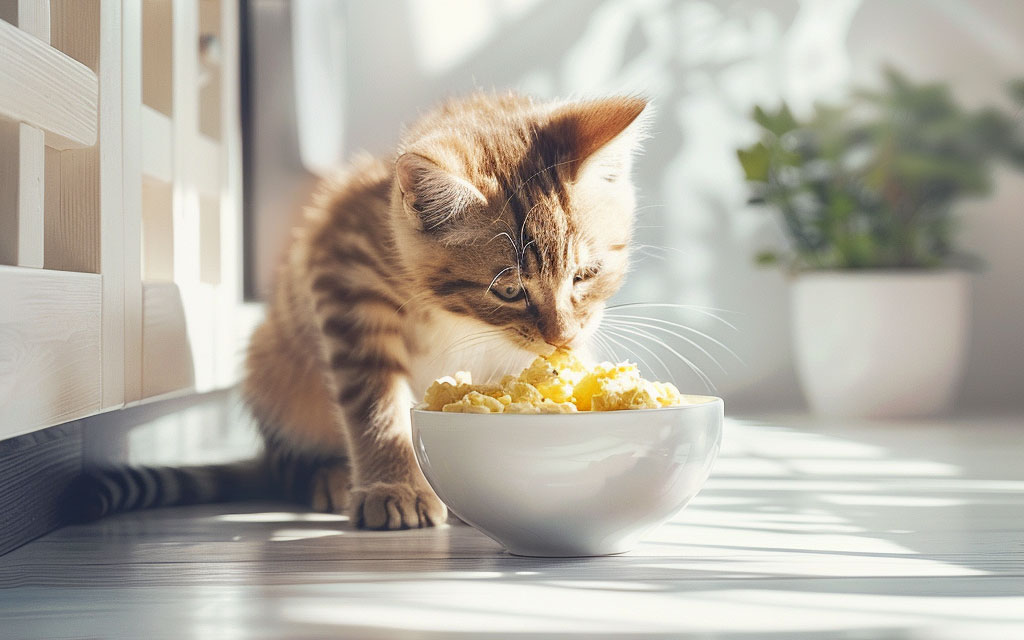
Grains & Carbs
Your cat’s diet should be low in carbohydrates, as a high-carb diet can cause obesity and other health problems in cats, like diabetes. However, some carbs are still necessary – and others make for nice treats on special occasions.
Can cats eat rice?
Cats can eat rice in small quantities every now and then, it’s gluten-free and lighter than wheat-based carbs, so it’s less “carby” than bread and pasta.
Can cats eat oats?
Yes! In fact, raw or cooked, oats are a good carb source for cats, as they’re light and gluten-free. They’re also rich in the amino acids tryptophan and lysine, which are fundamental in supporting muscle development and tissue repair.
Can cats eat bread?
Cats who aren’t gluten intolerant can have the odd corner of bread from your plate as a treat, but it shouldn’t be a regular part of their diet.
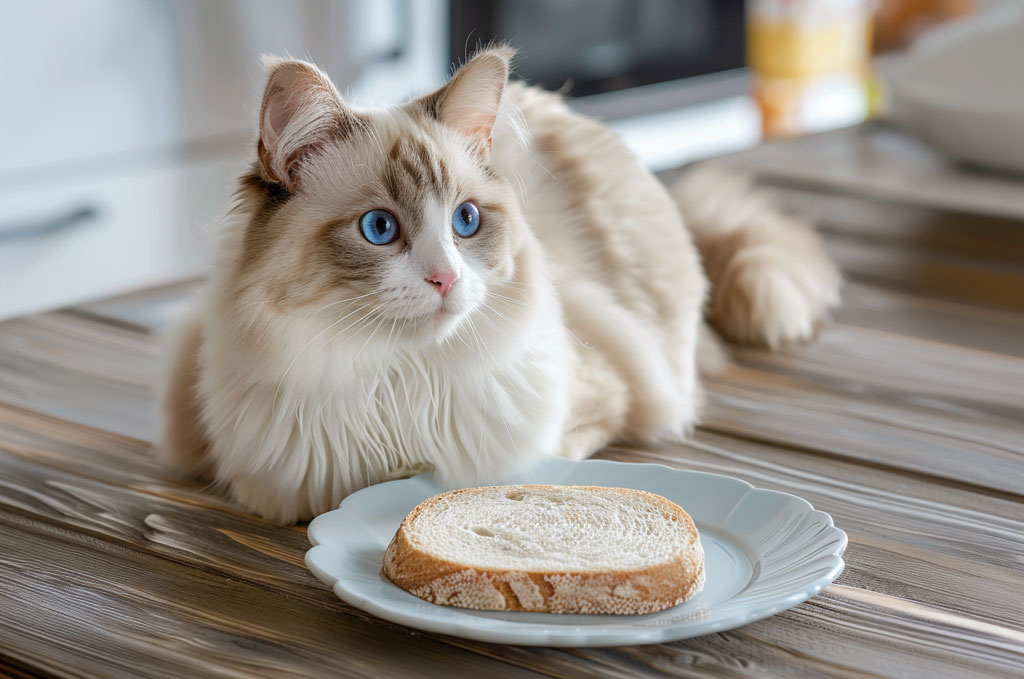
Can cats eat pasta?
A small handful of pasta is okay in your cat’s dinner every now and then if they’re not allergic to gluten, so long as it’s plain or mixed with something cat-safe.
Can cats eat potatoes?
Potatoes can be given to cats every now and then, depending on how they’re cooked. Boiled, baked, mashed, and roasted potatoes are all fine, so long as they’re plainly prepared or cooked with cat-safe ingredients. One or two french fries off your plate are also fine on occasion – just not every day!
Cooking Oils & Herbs
If you like to make homecooked meals & treats for your cat, it’s a good idea to know what oils, herbs, & spices are safe for them. Here are the best picks and their benefits:
- Olive oil – rich in mono-unsaturated fats
- Coconut oil – high in vitamin E & Omega-6
- Turmeric – a powerful anti-inflammatory
- Catnip – a natural mood enhancer
- Cat thyme – said to prevent some illnesses in cats
- Basil – packed with antioxidants
- Alfalfa – high in protein
- Sage – has antibacterial & antifungal properties
- Dill – nutrient-rich
- Cilantro – high in fiber
- Rosemary – said to be medicinal
- Thyme – has antibacterial & antifungal properties
Other Safe Treats For Cats
As mentioned above, treats are a crucial part of a pet’s well-being. They can aid training and provide fun rewards, and whether you use them as part of a game or just something to eat outside of mealtimes, daily treats keep life exciting. Consider using these tasty human food cat snacks as treats!
Peanut butter
Can cats eat peanut butter? Yes! Whilst it’s not particularly nutritional, a few licks of peanut butter make for a delicious snack for cats, so long as it doesn’t contain Xylitol.
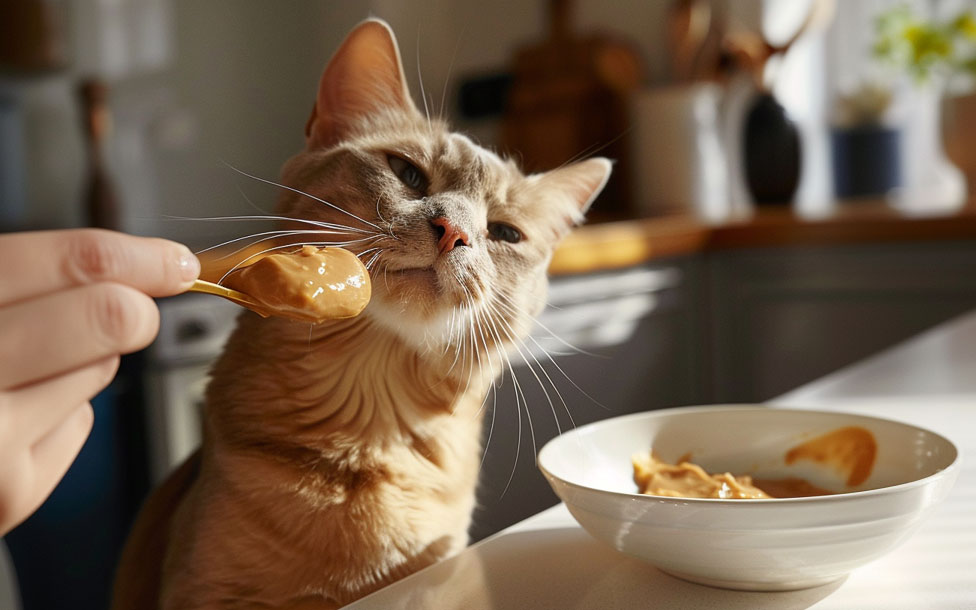
Honey
Although cats experience sweetness differently, that doesn’t mean to say they can’t taste it, just that it’s a different experience. Plenty of cats seek out sweet stuff, so if your cat likes sugar, try half a teaspoon of honey! You can give it to your cat on its own, on a licky mat, on top of another treat, or in water.
Sunflower seeds
Seeds are a cat-safe snack that can aid digestion, and sunflower seeds in particular are high in protein, vitamins E, B1, and B5, as well as manganese, copper, and healthy polyunsaturated fat.
Toxic Human Food for Cats
If your cat eats a tiny amount of something toxic, they might be okay, but to be on the safe side, you should call your vet or the Pet Poison Helpline. If they eat large amounts of toxic food or even small quantities of high-toxicity foods, you need to seek help from your emergency vet.
Signs of poisoning in cats include tremors, drooling, vomiting, seizures, difficulty standing or incoordination, and collapse.
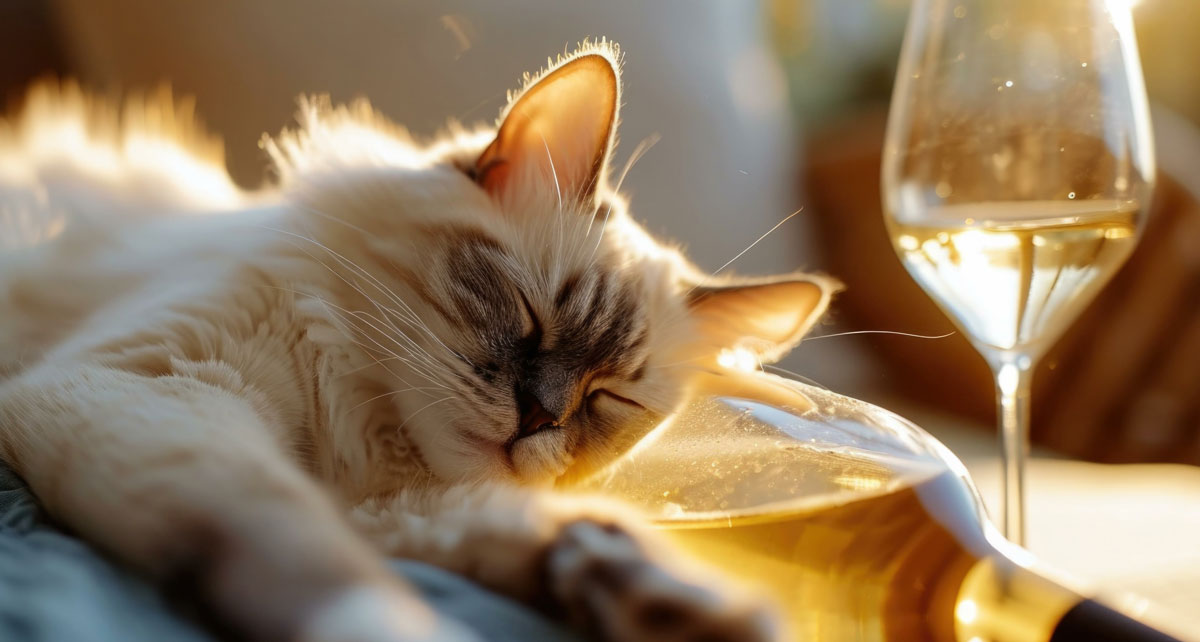
Toxic foods for cats include:
- Chocolate
- Alcohol
- Caffeine
- Raw dough
- Xylitol
- Grapes
- Raisins
- Oranges
- Lemons
- Limes
- Avocado
- Onions
- Leeks
- Eggplant
- Garlic
- Chives
Choking hazards you should also avoid:
- Nuts
- Whole pitted fruits
- Cooked bones
Final Thoughts on Human Foods Cats Can Eat
That’s our guide on safe human foods for cats! The right daily meals are the most important thing, but when adding fun toppers and snacks to your cat’s diet, remember to steer clear of the toxic foods listed above and stick to portion & regularity guidelines. Moderation is key to a balanced diet and talk to your vet before making any big dietary changes.
If you’re wanting to get top nutritional meals for your cat but don’t have the time or confidence to make them homemade meals, you may want to consider a convenient cat food delivery service. These services ensure your cat is not only well-fed but thriving. After all, a happy, healthy kitty makes for the purrfect companion!

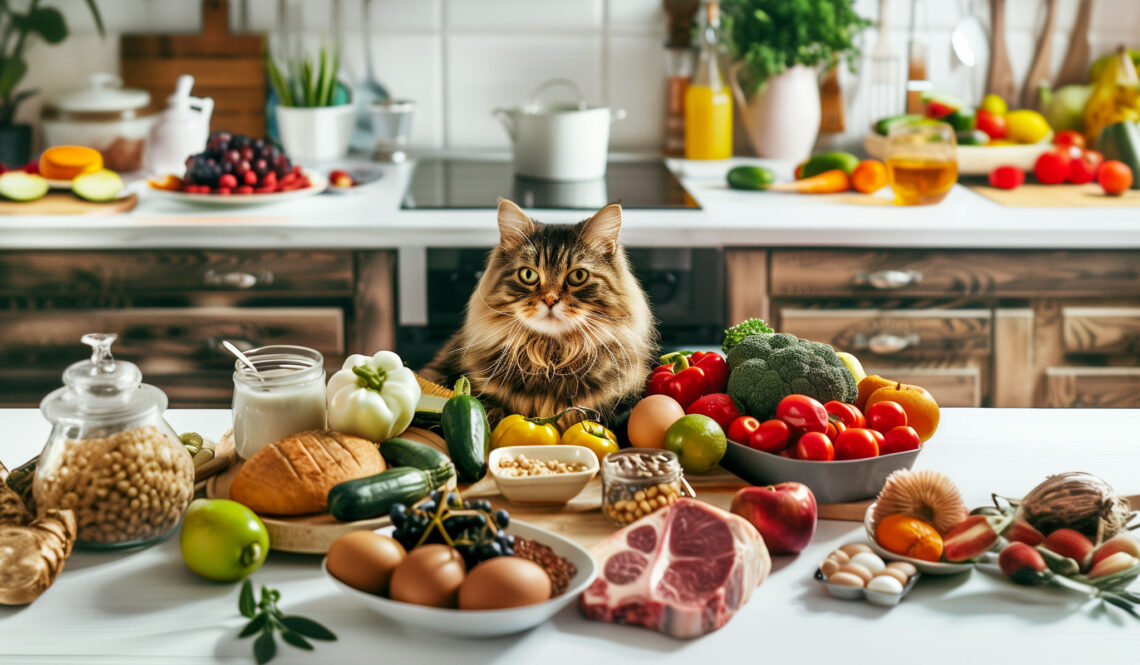

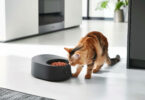
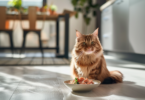
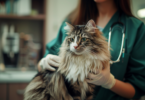


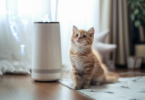
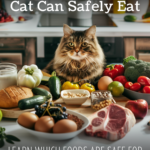
Leave a Comment